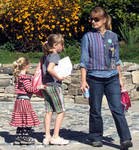7 x7 Seven Subjects & 7 things I learned April 10 & 11, 2013 Days 132, 133
1. Math
a. I like practicing math on Khan because
it helps me practice doing math in my head, which I need more practice on.
b. The thing I wish Khan would change is
when you typed the wrong number in for your answer, you lose all your points.
c. In arithmatricks today I practiced
estimating by 49 and 51.
d. 700 / 49 = 14
e. 450 / 51 = 9
f. 320 / 49 = 6.4,
180 / 51 = 3.6
g. 910 / 49 = 18.2
270 / 51 = 5.4
2. Science
a. Today in Science I learned about
geothermal energy. Geothermal energy is energy that comes from the heat of
Earth’s core.
b. A geothermal power plant can capture the
steam, and then run it through a turbine to generate electricity that can be
transmitted to homes and businesses.
c. For every 328 feet you go into the
ground, the temperature rises 5.4 degrees Fahrenheit!
d. So, 2.5 miles below the surface of the
Earth, the temperature reaches 250 degrees Fahrenheit.
e. To make steam in some cases where steam
does not naturally come out from the Earth’s core, Cold water is pumped into
holes drilled very deep. The cold water is heated naturally by hot rock below.
Hot water resurfaces where it is used to create electricity.
f. Some of the things used in a geothermal
power station are a generator, Insulating sedimentary rock, and a heat
exchanger.
g. The hot springs at Yellow Stone National
Park are a perfect example of heat in the Earth’s crust producing hot water and
steam.
3. History
a. I learned that Cleopatra lived the
fantasy life of a young princess, until her father was driven out of Egypt and
fled to Rome for help. That’s when Cleopatra turned from a young princess to a
shrewd queen- in- waiting.
b. Cleopatra quoted, “The people did not
like my father. They called him Auletes, the flute player, and they scorned his
sacrifice of money, dignity, and land to the Romans, and yet he protected the
throne.”
c. Cleopatra was the second child born to
King Ptolemy XII. Her father was a weak and unpopular ruler, who managed to
remain in power only by paying huge bribes to the Romans.
d. I learned that the name of the time of
the flood of the Nile was known as, “Ahket.” This was from July to October.
e. Egyptian farmers worked with cycles as
the waters rose and fell. Farmers never needed to use fertilizers because the
floodwater made the soil so rich by the nutrients and silt the floodwaters left
behind.
f. Egyptian farm tools included plows and
hoes.
g. Schemu was the season of harvest in
Egyptian times.
4. Language
a. Today in Spanish I worked more with time.
And what I do in my daily routine.
b. I learned that in Spanish, when you talk
about a daily routine, you use the verbs present tense, the verb shows who is
doing the action. Miro, como, voy, hago. I watch, I eat, I go, I do.
c. Some verbs are known as reflexive verbs.
Reflexive verbs always have a pronoun in front of them. Me levento. I get up
Me visto I dress
Me lavo los dientes. I clean my teeth.
d. When the preposition “a” is followed by
the masculine noun, el becomes al.
Voy al colegio I go to school.
e. To talk about a specific time in Spanish
you use the word, “a” A las diez, At ten o’ clock.
f. Me levanto a las siete y media. I get up
at half past seven.
g. Como el medioda. I have lunch at midday.
5. Reading
a. In reading today I read a story about two
kids who won a science fair.
b. Who are the characters in the story?
Sean, Dexter, Sean’s mom, Mrs. Frommer.
c. What is the setting for the story? Time
of year? Fall
Place 1: Dexter’s garage
Place 2: The science fair
Place 3: the computer store
Place 4: the science fair.
d. What is the problem in the story? Sean
and Dexter don’t have enough money to buy a computer chip for the robot they
are building for the science fair.
e. How do the main characters try to solve
the problem?
They get jobs to try and earn enough money
together to buy the computer chip.
f. What event helps the characters solve
their problem?
When their Science teacher gives them a
coupon to the computer store.
g. At the end of the story Dexter and Sean
win the science fair.
6. Writing
a. In writing today I worked with figuring
out what was a fact and what was an opinion.
b. Write two facts from the article that
Daniel Murphy wrote. Reading involves having access to books.
c. The library is not open before or after
school, and there is not enough time between classes.
d. Then I wrote two opinions from the
article. By choosing their own opinions from choosing their own reading
material students would be more motivated to read on their own.
e. Our school should rethink the library
and its use.
f. Write some opinion words. Think, should,
need.
g. Write an opinion fact from the response
from Juanita:
I know so many kids who don’t really know
what’s in the library.
7. Art

No comments:
Post a Comment